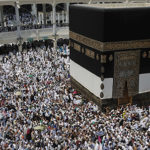WACO—Christians and Muslims believe in the same God as Creator, but the God and Father of Jesus Christ is not the God of the prophet Mohammad, a Methodist theologian told a gathering at Baylor University.
"Christians and Muslims believe in the same God. They do not worship the same God," William Abraham said.

The Kaaba during Hajj in Mecca.
|
Even so, common belief in the Creator shared by Christianity and Islam may provide the basis for Muslims' full engagement in American political and civil life, he asserted.
Baylor's Center for Ministry Effectiveness & Educational Leadership and Truett Theological Seminary's Kyle Lake Center for Effective Preaching sponsored the symposium that asked, "Do Christians and Muslims worship the same God?"
Abraham, an Irish-born scholar in philosophical theology who serves as Albert Cook Outler Professor of Wesley Studies at Southern Methodist University's Perkins School of Theology, insisted the question is not just an abstract ivory-tower debate.
"The identity of God in Christianity and Islam is not just a hot ecclesiastical and political issue. It is also a critical theological and missiological issue," Abraham said.
"Can we assume that we are speaking of the same God when we speak to Muslims of the God and Father of our Lord Jesus Christ? In sharing the gospel with Muslims, should we assume that we believe in the same God, or should we tacitly seek to wean them away from belief in Allah?"
Abraham believes Christians and Muslims find common ground in that both identify God as "the one and only Creator of the world who is all good, all powerful and worthy of worship and obedience."
Sign up for our weekly edition and get all our headlines in your inbox on Thursdays

William Abraham (left) from Southern Methodist University's Perkins School of Theology responds to comments from panelists (left to right) Abdulhakim Ali Mohamed, executive director of the Texas Islamic Council, USA; Abjar Bahkou, lecturer of language and culture at Baylor University; and Chris van Gorder, associate professor of religion at Baylor. (PHOTO/Julie Covington/Baylor Center for Ministry Effectiveness)
|
But Christians worship God as Trinity and view Jesus as God incarnate, while Muslims worship God as One and reject as heresy the idea God would become a flesh-and-blood man, he said.
"Coming to terms with the Christian identity of God is not philosophical nitpicking," he said. "Expounding the identity of the Triune God calls for joyous sharing and celebration of the gospel with the Muslim world."
Both the common understanding of God as Creator and the dramatically different views about the divinity of Christ should be considered as Christians seek to evangelize Muslims, Abraham said. He pointed to his experience speaking to Muslims in Kazakhstan.
"I sought to build on our shared, initial conception of God and to persuade them that the full truth about God and his great salvation had come in Christ," he said.
Turning from theology to politics, Abraham asserted the common Creator acknowledged by Muslims and Christians essentially equates with the generic God of American civil religion.
"Broadly, the God of American public theology is identified as the one and only Creator of the universe who acts providentially in history. This is not the same God that either Christians or Muslims worship, but it is the same God that Muslims and Christians believe exists," he said.
Christians who "get hot and bothered" about the minimalist identity of God in civil religion "should relax and smell the coffee," he insisted.
"The minimalist conception of God is precisely the strength of American public theology," Abraham asserted. "What began as a theology that grew out of Protestantism extended to include Roman Catholics and Eastern Orthodox immigrants and extended further to include Jews. This was possible because they could all acknowledge God under the deflationary description of the one and only Creator of the universe in the public square."
That belief means "at least we have a toehold for inclusion of Muslims in the full political life of North America," he said.














We seek to connect God’s story and God’s people around the world. To learn more about God’s story, click here.
Send comments and feedback to Eric Black, our editor. For comments to be published, please specify “letter to the editor.” Maximum length for publication is 300 words.